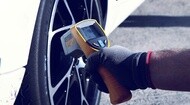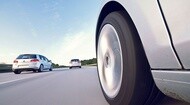
Auto Tips & Advice
Pressure is key
Tire maintenance tips
- Check your tire pressure monthly. Underinflated tires increase fuel consumption. Overinflated tires have less grip.

How to drive to reduce fuel consumption:

Maintain proper air pressure
Underinflated tires are one of the biggest causes of using excess fuel in the world. The American Automobile Agency has stated that operating a vehicle with underinflated tires can result in a 25% reduction in fuel economy.
Select low rolling resistance tires
The lower the rolling resistance, the less effort from your engine, the better the gas mileage. Some additional tips:
- Drive at a constant speed, avoiding rapid stops and starts.
- Turn off the engine when the car is at a standstill, for example in a traffic jam or at a railroad crossing, if it is safe to do so.
- Drive light. Extra weight increases fuel consumption and polluting emissions.
- Remove unused accessories like roof racks and luggage carriers, which create aerodynamic drag.
Want to learn more about sustainability and MICHELIN?
Choosing your tires:
- Choose tires that have “fuel economy” as one of their main performance characteristics.
- Tires that have “traction” as their main characteristic will often have reduced fuel economy; winter tires and tires for heavier vehicles such as SUV and light trucks might not be the most fuel-efficient.


Find tire dealers near you in seconds
Search by
Address, City or ZIP code
Top 5 cities in the United States

